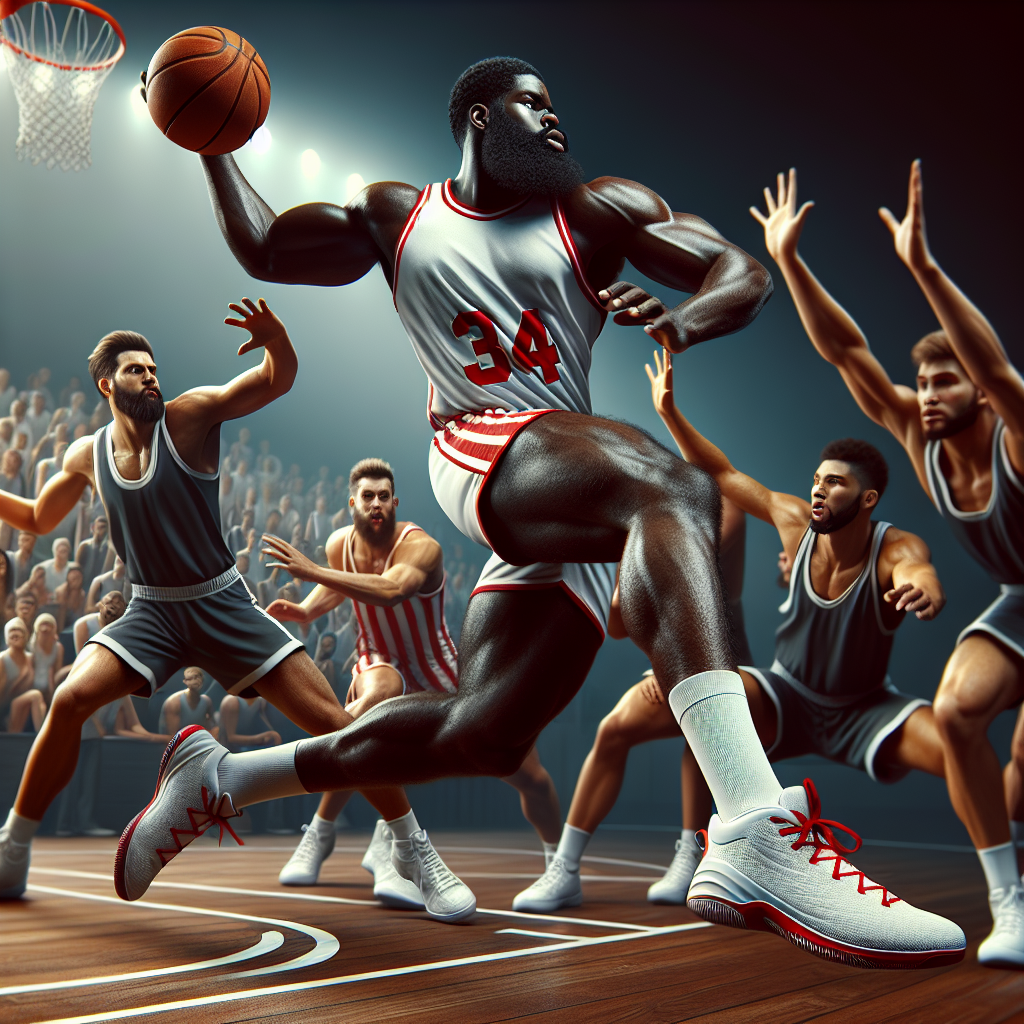James Harden has become a household name in the world of basketball, not just for his impressive talent on the court but also for the transformation he has brought to the sport.
Born on August 26, 1989, in Los Angeles, California, Harden’s early life was steeped in basketball. He played for the Arizona State University and quickly emerged as one of the top prospects in college basketball. His transition to the NBA came in 2009 when he was selected third overall by the Oklahoma City Thunder.
During his time with the Thunder, Harden honed his skills alongside other stars like Kevin Durant and Russell Westbrook. However, it wasn’t until he was traded to the Houston Rockets in 2012 that he truly began to shine. In Houston, James Harden evolved into an offensive juggernaut, winning the NBA Most Valuable Player (MVP) award in 2018. His ability to score from almost anywhere on the court, combined with his exceptional passing, has redefined the shooting guard position.
Harden’s signature playing style includes an array of step-back three-pointers, explosive drives to the basket, and a propensity to draw fouls. This unique style has not only made him a nightmare for defenders but has also sparked debates among fans and analysts about the future of offensive strategies in basketball.
One remarkable aspect of James Harden’s career is his consistent scoring ability. Over the last several seasons, he has regularly averaged over 30 points per game. This feat, which is rare in the NBA, showcases not only his scoring prowess but also his durability and commitment to fitness. His scoring title wins have contributed to his reputation as one of the most prolific scorers in modern basketball history.
Beyond his individual accomplishments, Harden’s impact on team dynamics cannot be overlooked. His playmaking ability has transformed his teammates, elevating their performances and making them more effective. Players like Eric Gordon and Clint Capela flourished during their time next to Harden, benefiting from his ability to draw defenders and create open shots.
In addition to his offensive brilliance, James Harden has shown strides in improving his defensive game. While initially criticized for a lack of defensive effort, Harden has made significant improvements on the other end of the court, contributing to his team’s overall defense and making key stops when necessary.
As he moves through his career, Harden has faced challenges, including injuries and playoff disappointments. His time with the Brooklyn Nets following his trade from Houston in 2021 offered a glimpse of his potential to secure an elusive championship. However, injuries plagued the team, leading to another season of unfulfilled expectations.
In recent discussions about James Harden‘s legacy, the focus has shifted to his ability to adapt and grow. Will he be remembered solely as a stat sheet stuffer, or will his influence reshape how the game is played in the long run? While time will tell, one thing is clear: his contributions to basketball are undeniable and will be felt for years to come.
This journey has just begun as James Harden continues to push the boundaries in basketball, capturing the attention of fans and analysts alike. The evolution of his style and the way he has influenced the game will leave a lasting impression on both current players and future generations of basketball enthusiasts. James Harden’s journey is not merely a tale of scoring—it’s a story about revolutionizing how basketball is played today. ——
In the second part of this article, we will delve deeper into the controversies surrounding James Harden’s career as well as his philanthropic efforts off the court. As one of the most talked-about players in the NBA, James Harden has inevitably faced controversies throughout his career. From his departure from the Oklahoma City Thunder to the trade demands during his time with the Houston Rockets, Harden’s choices have often made headlines, sparking debate and speculation among fans and analysts.
The trade from the Thunder was a significant moment in his career. While many were surprised by the move, it allowed Harden to become the franchise player for the Rockets, which would eventually be the turning point in his career. However, the criticism surrounding his exit from Oklahoma City lingered for years. Some viewed him as a player who abandoned a championship-caliber team in search of personal glory, while others recognized his desire for an opportunity to showcase his talent.
Furthermore, his time with the Rockets was not without its share of controversies. Media scrutiny intensified in the 2020 playoffs when, after losing to the Los Angeles Lakers, Harden faced criticism for his performance and inability to lead the team deep into the playoffs. The pressure mounted as discussions around his style of play—often deemed too reliant on isolation and free throws—came to the forefront. Critics argued that such a style might not be conducive to winning championships, placing an asterisk next to his impressive statistics.
On a personal level, it is essential to address James Harden’s philanthropic efforts, demonstrating that he is more than just a basketball player. Through various initiatives, he has positively impacted many lives, particularly in his hometown of Los Angeles. In recent years, he has made substantial contributions to help rebuild communities and provide opportunities for underprivileged youth. His dedication to giving back highlights a more profound aspect of his character, further enriching his legacy in and out of basketball.
Among these initiatives, he has organized charity events, supported education programs, and funded scholarships, hoping to inspire the next generation. Harden’s example proves that professional athletes can be role models beyond their performance on the court.
In conclusion, James Harden embodies the duality of an athlete: the pursuit of greatness within the game juxtaposed with the responsibility of impacting society positively. As he continues to navigate through the highs and lows of his career, it remains paramount to recognize not only his basketball achievements but also the contributions he makes off the court. ——
As we wrap up our exploration of James Harden, it’s important to reflect on his influence on the game of basketball and the legacy he will leave behind. The question of what defines a great player often hinges on a combination of statistics, championships, and the ability to inspire others.
Throughout his career, Harden has undoubtedly compiled a statistics sheet that rivals those of the all-time greats. However, his inability to secure an NBA championship has led many to question his legacy. The narrative surrounding James Harden remains nuanced—combining both the praise of his skill with the critique of unmet expectations.
Yet, it’s vital to appreciate the evolution he has instigated within the sport. Whether it is redefining how guards are perceived in terms of scoring versatility or advocating for improved styles of play, Harden’s impact will resonate for years to come. His influence can already be witnessed in the next wave of basketball players who have adopted his scoring techniques and playmaking abilities.
This evolving landscape of basketball has shifted towards a more offensive-minded approach, with Harden at the forefront of this change. The three-point revolution, the emphasis on ball movement, and the incorporation of analytics to optimize play have become hallmark features of the NBA. His contribution to these trends cannot be understated, and it reinforces the notion that James Harden will always be remembered as a pivotal figure in basketball history. Ultimately, as fans, we often must look beyond championships to appreciate a player’s influence and impact on the game. James Harden symbolizes that complexity—a journey balancing personal glory with a collective responsibility towards the evolution of basketball itself. As he continues to cultivate his legacy, his story will be a lasting part of basketball lore, showcasing the many dimensions of greatness. In summary, we recognize James Harden’s impressive contributions to the NBA, the game of basketball, and the communities he impacts off the court. No matter how his career unfolds, he has already cemented his status as one of the most influential basketball players of our time.










